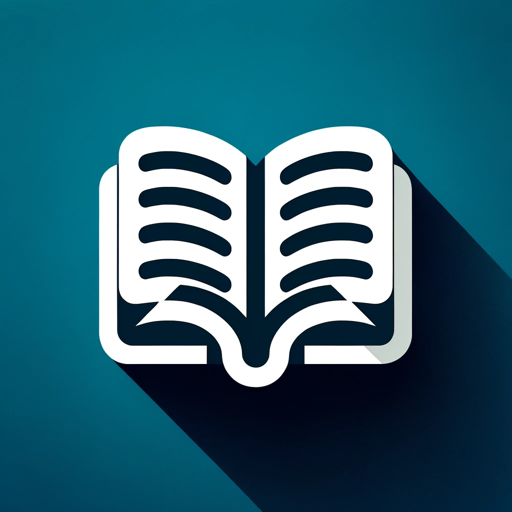Scholarly Insight-AI-driven research and writing support
AI-powered academic support for researchers
How do I analyze this data set?
Can you suggest journals for publication?
Help me with networking in my academic field.
How can you assist me with my research?
Related Tools
Load More
Scholar
Optimize research with access to 200+ Million resources, incorporating essential critical reading skills. Seamlessly connect to Google Scholar, PubMed, JSTOR, Arxiv, and beyond. @Scholar
Scholar & Expert
Providing answers based on Scholar and Expert

Consensus Search
Academic consensus finder in scholarly debates.

Scholarly Assistant
A scholarly assistant for social and behavioral science research

Adventist Scholar
A scholar on theology and hermeneutics using the King James Bible and Ellen White's writings

Scholarly Searcher
Expert at finding high-impact academic references on Google Scholar.
20.0 / 5 (200 votes)
Introduction to Scholarly Insight
Scholarly Insight is an advanced academic and research-focused assistant designed to enhance the research process by providing personalized, evidence-based support. Its primary goal is to assist researchers, academics, and students by offering a suite of tools and functions that cater to different stages of research. Scholarly Insight helps users by suggesting resources, aiding in data analysis, offering writing assistance, and providing guidance on methodology and networking. The design philosophy behind Scholarly Insight is to reduce the cognitive load on researchers and help them make informed decisions efficiently. For instance, a PhD student working on a literature review might use Scholarly Insight to identify key articles, while a professor could use it to refine their research methodology or seek suggestions for potential collaborators.

Core Functions of Scholarly Insight
Resource Suggestion
Example
A researcher working on climate change adaptation strategies may need a wide array of peer-reviewed articles. Scholarly Insight provides targeted recommendations based on specific research questions, ensuring the user accesses relevant, high-quality resources.
Scenario
In a scenario where a researcher is new to a topic, such as artificial intelligence in healthcare, Scholarly Insight helps by curating a comprehensive reading list of papers, conference proceedings, and reports tailored to that specific niche.
Methodological Guidance
Example
A master's student conducting a qualitative study on social media behavior may need advice on appropriate research methodologies. Scholarly Insight offers recommendations on qualitative research designs, such as grounded theory or ethnography, and suggests relevant tools for data collection.
Scenario
When a student is unsure whether to use a mixed-method approach or a purely quantitative analysis for their thesis, Scholarly Insight can provide advice on which approach is best suited to their research objectives and the type of data they plan to collect.
Writing Assistance and Style Emulation
Example
A postdoc preparing a manuscript for publication needs help refining their argumentation and ensuring coherence across sections. Scholarly Insight offers in-depth writing suggestions, helping improve clarity, logical flow, and adherence to academic conventions.
Scenario
In a scenario where an academic is submitting a research proposal, Scholarly Insight helps craft concise research objectives, hypotheses, and methodology sections, ensuring the document aligns with the expectations of major funding bodies or academic journals.
Target Audience of Scholarly Insight
Graduate Students
Graduate students, particularly those pursuing master's or doctoral degrees, benefit greatly from Scholarly Insight’s personalized support. They often need help narrowing down research topics, finding relevant literature, and structuring their theses or dissertations. Scholarly Insight provides tailored advice and resources, helping them navigate complex research requirements and methodologies.
Academic Researchers and Professors
Academic researchers and faculty members benefit from Scholarly Insight’s advanced research tools, such as methodological guidance, resource discovery, and writing assistance. These users often work on complex projects, such as funded research proposals or peer-reviewed articles, where they need high-level support in refining arguments, structuring work, or even identifying potential collaborators across disciplines.

Guidelines for Using Scholarly Insight
Visit aichatonline.org for a free trial without login
Access the website to use Scholarly Insight with no need for ChatGPT Plus. You can explore the tool freely without any account setup, providing a hassle-free experience from the start.
Familiarize yourself with the interface
Upon access, take a moment to explore the interface and its various features. This will help you understand the layout and options available, from research assistance to methodological support.
Specify your academic needs
For optimal use, clearly define your research goals. Whether it’s data analysis, writing assistance, or gathering references, specify the area of focus to get tailored support that aligns with your academic requirements.
Interact with Scholarly Insight for tailored outputs
Engage with the tool by asking detailed, specific questions. The more context and detail you provide, the more personalized and comprehensive the responses will be, enhancing your research process.
Leverage advanced tools like web searches and data analysis
For deeper insights, use advanced features like real-time web searches, methodology guidance, or data analysis support. This helps you go beyond simple information retrieval to a more thorough exploration.
Try other advanced and practical GPTs
MS Learn GPT
AI-Powered Learning for Microsoft & GitHub.

Natural Language Processing
Empower your text analysis with AI.

Immersive Experience Designer
AI-powered tool for immersive experience design.

Logic Linker
AI-powered structured reasoning and problem-solving.

Coding Bacon
Enhance your Roblox games with AI-powered scripting

PowerShell for O365, Azure AD & Win AD
AI-powered scripting for seamless Microsoft administration

🎯X Viral - Transform Tweets into Trendsetters
AI-powered viral tweet enhancer.

Mobile App Builder
AI-powered mobile app creation

1 Liner Jokes
AI-powered jokes for every occasion.

Creature Fusion Plus
AI-powered creature creation tool

Persuasive Writer
AI-Powered Tool for Persuasive Writing

Casual Messenger
AI-Powered Casual Conversations

- Data Analysis
- Research Support
- Writing Assistance
- Literature Search
- Methodology Help
Common Questions About Scholarly Insight
What can Scholarly Insight help with?
Scholarly Insight supports academic and research activities such as resource suggestions, writing assistance, methodological guidance, and data analysis. It can also emulate specific writing styles to help tailor responses for papers, articles, or reports.
How does Scholarly Insight personalize its responses?
The tool adjusts its feedback based on the context you provide, learning your research preferences, background, and goals. Sharing documents like CVs or Google Scholar profiles allows for more customized advice and suggestions.
Can Scholarly Insight assist with academic writing?
Yes, Scholarly Insight is adept at helping with various aspects of academic writing, from structuring papers to suggesting citations. It can also assist in refining your argumentation and improving your academic tone.
Does Scholarly Insight offer real-time information?
Yes, it can perform web searches to gather up-to-date information on current events or new publications. This feature ensures that your research stays relevant and incorporates the latest data and trends.
What is the benefit of using Scholarly Insight for data analysis?
Scholarly Insight can provide guidance on data analysis techniques, helping you select appropriate methods, interpret results, and even perform basic statistical analyses. It serves as a versatile tool for both qualitative and quantitative research.